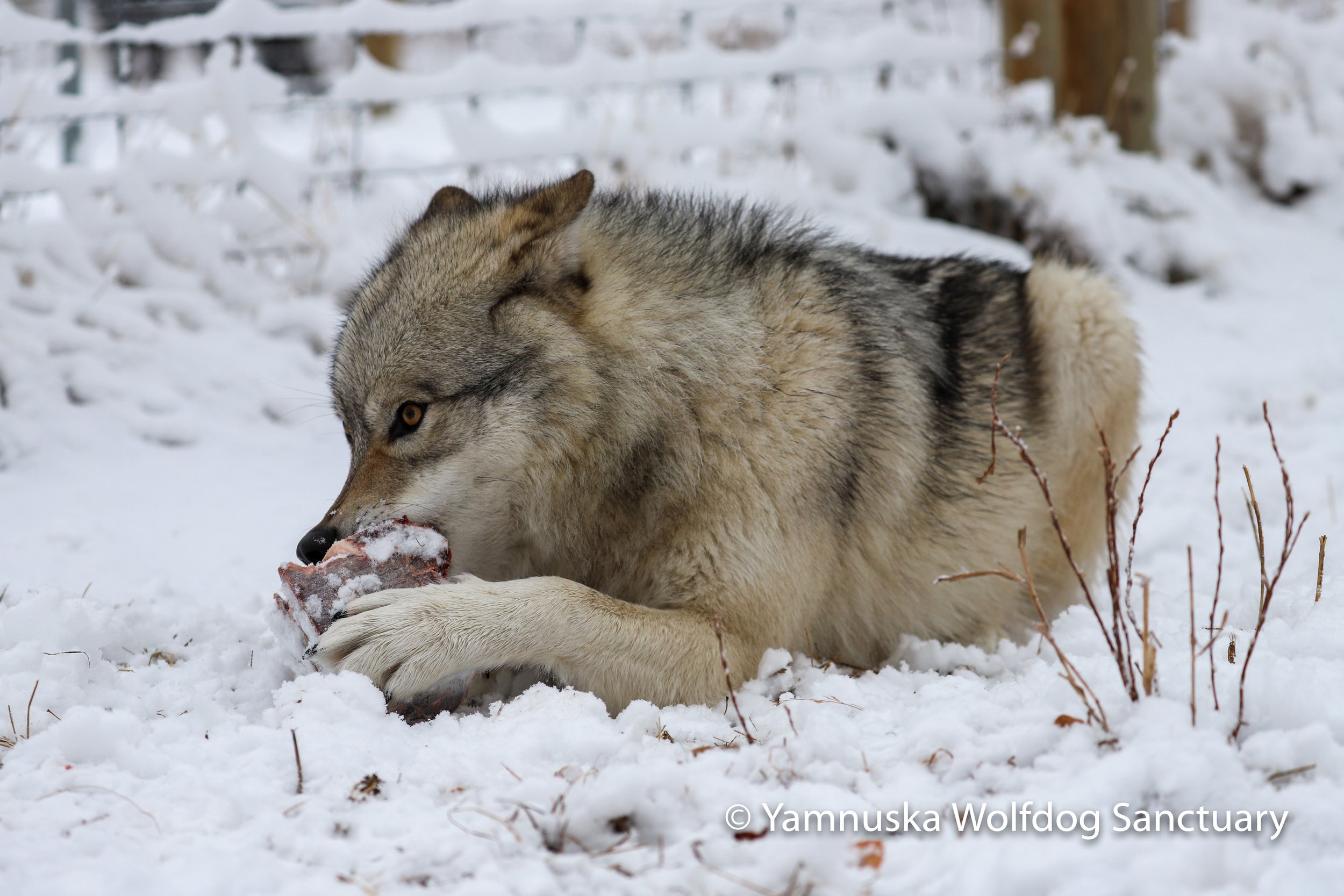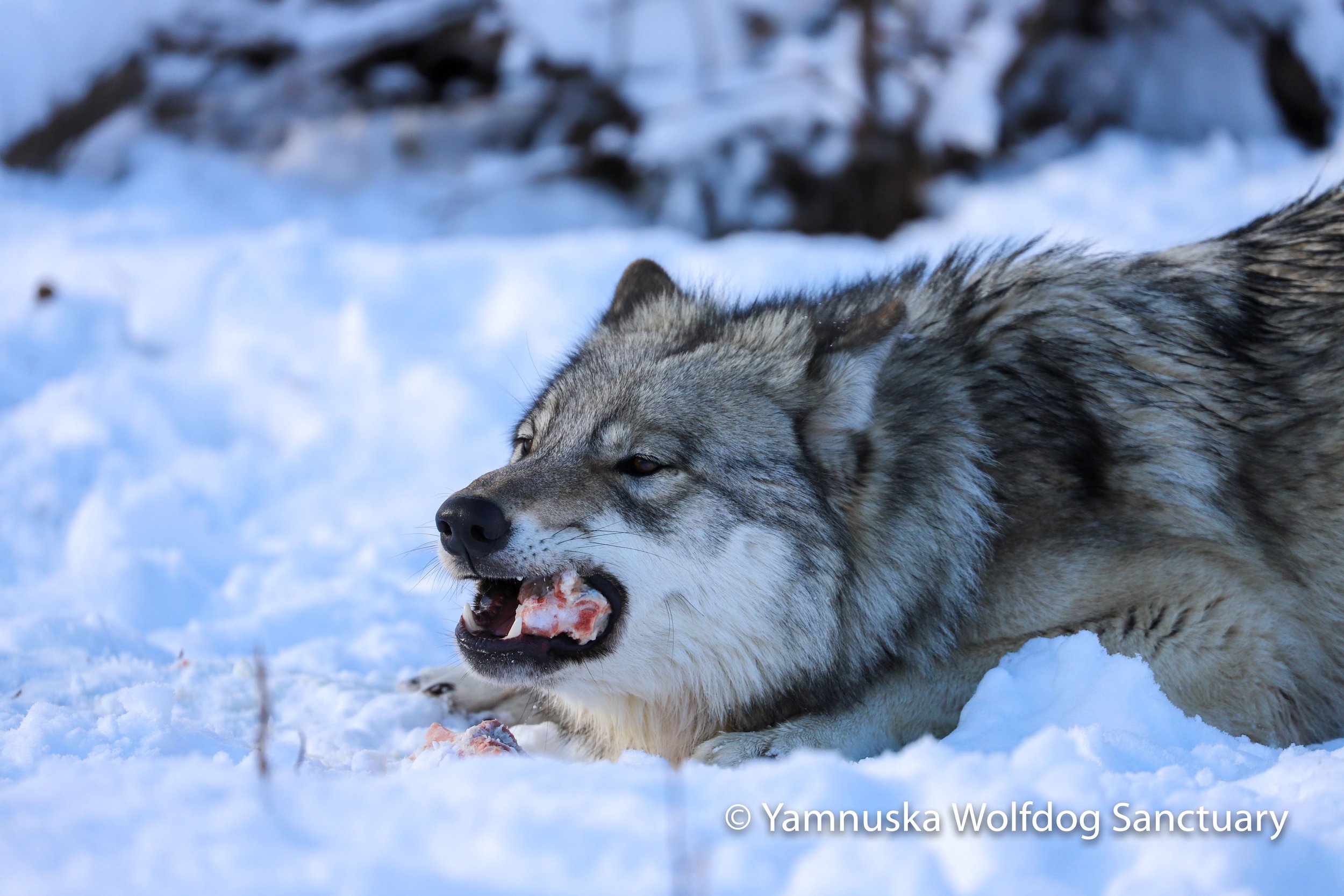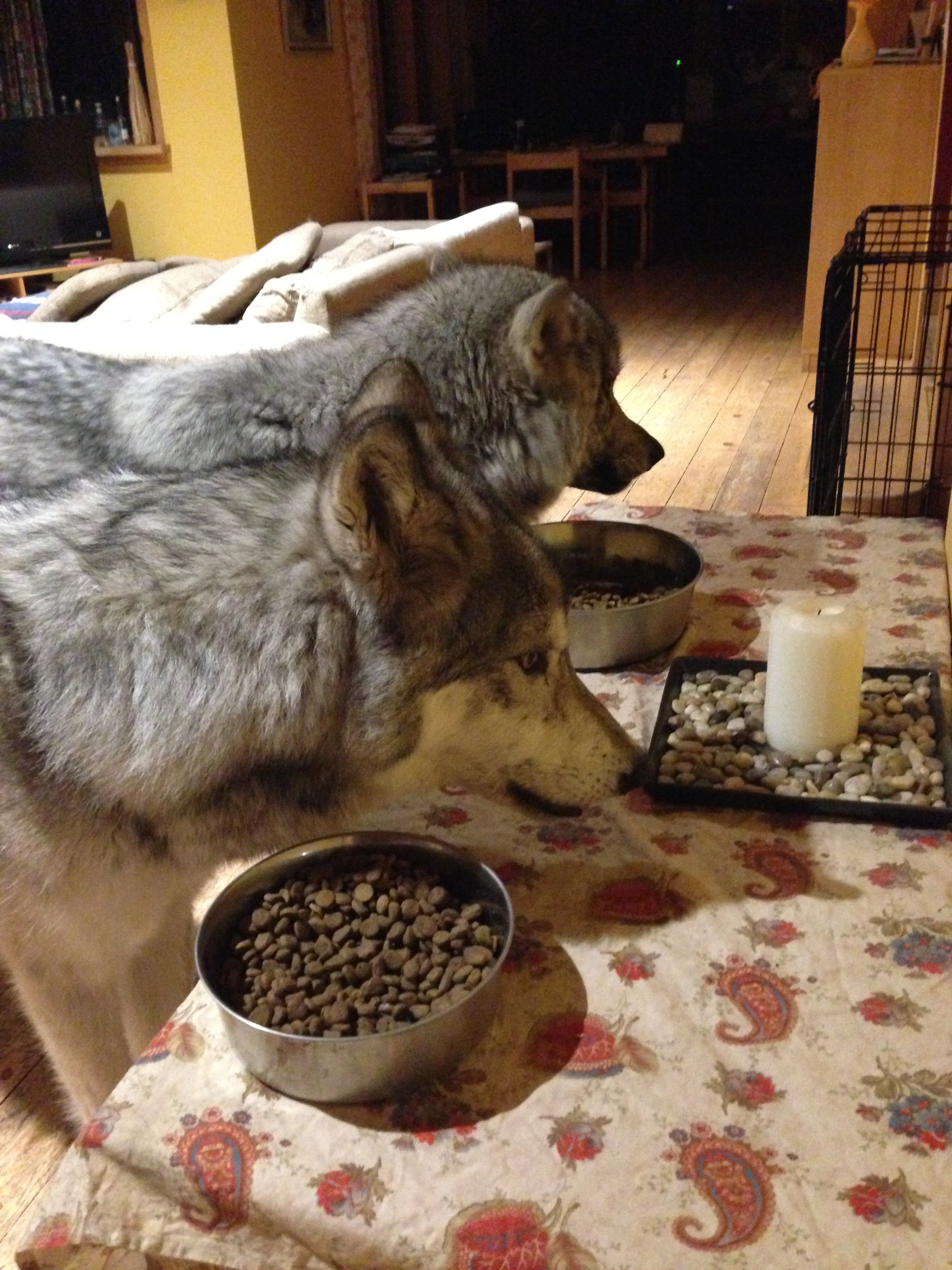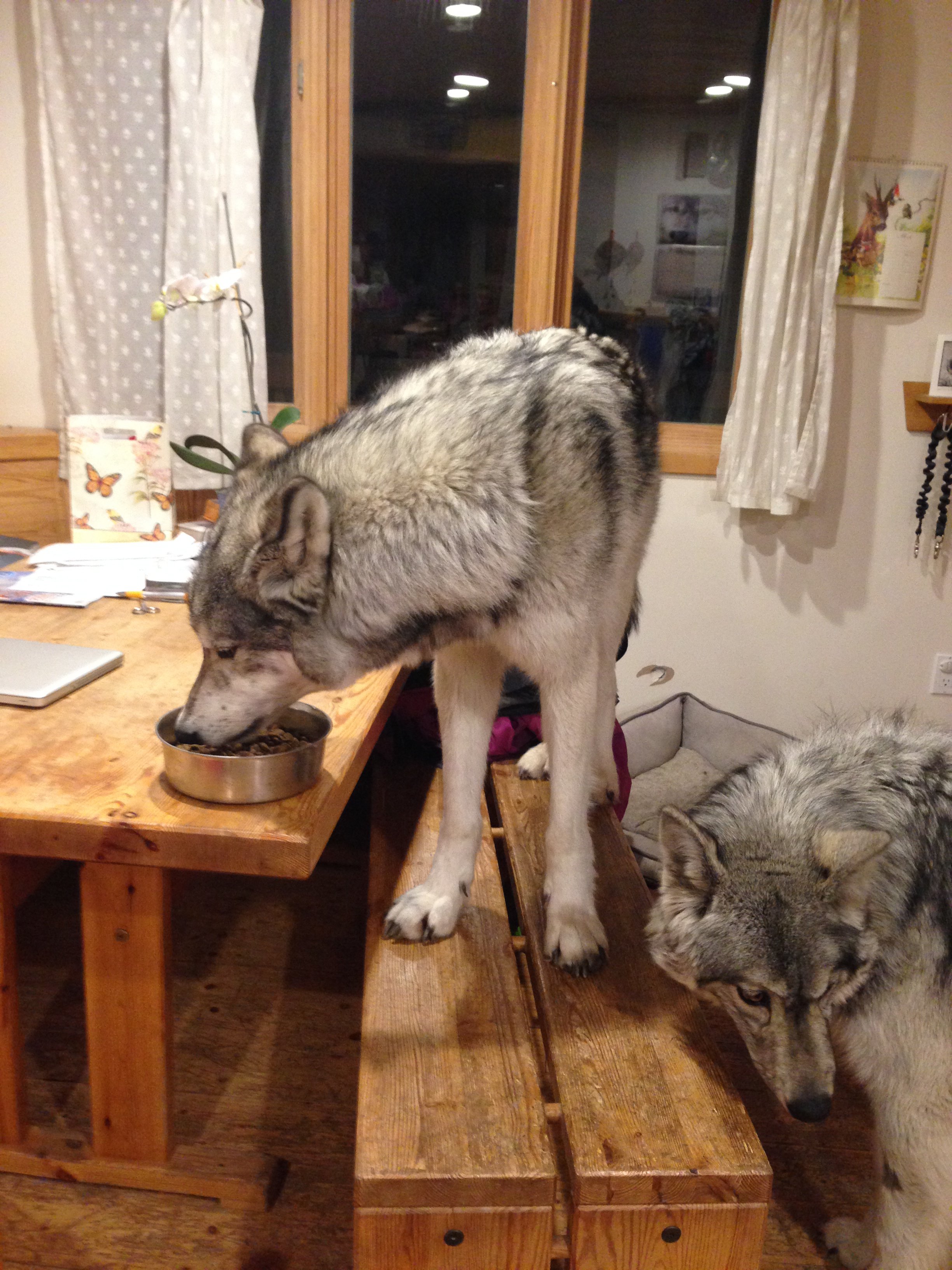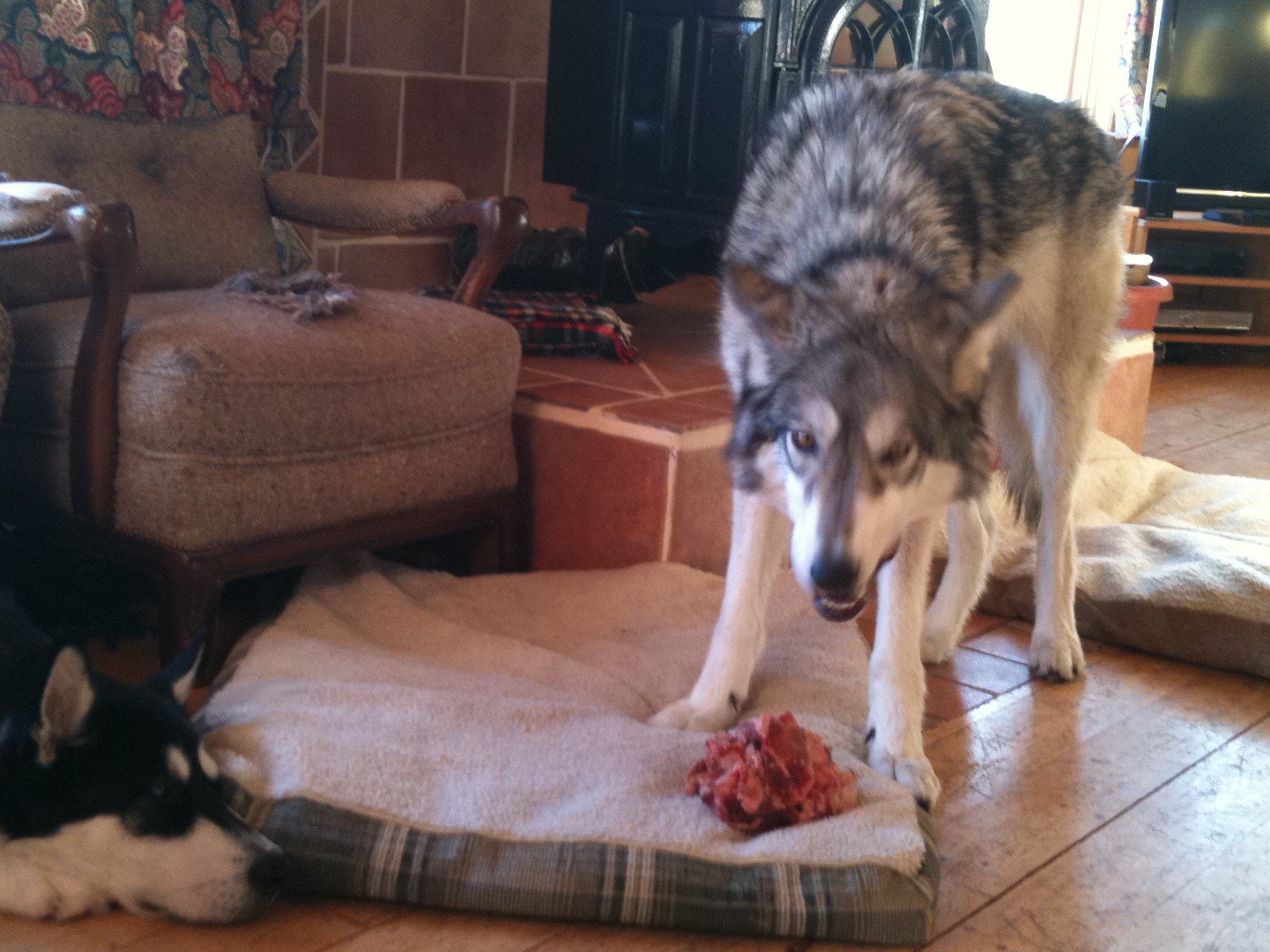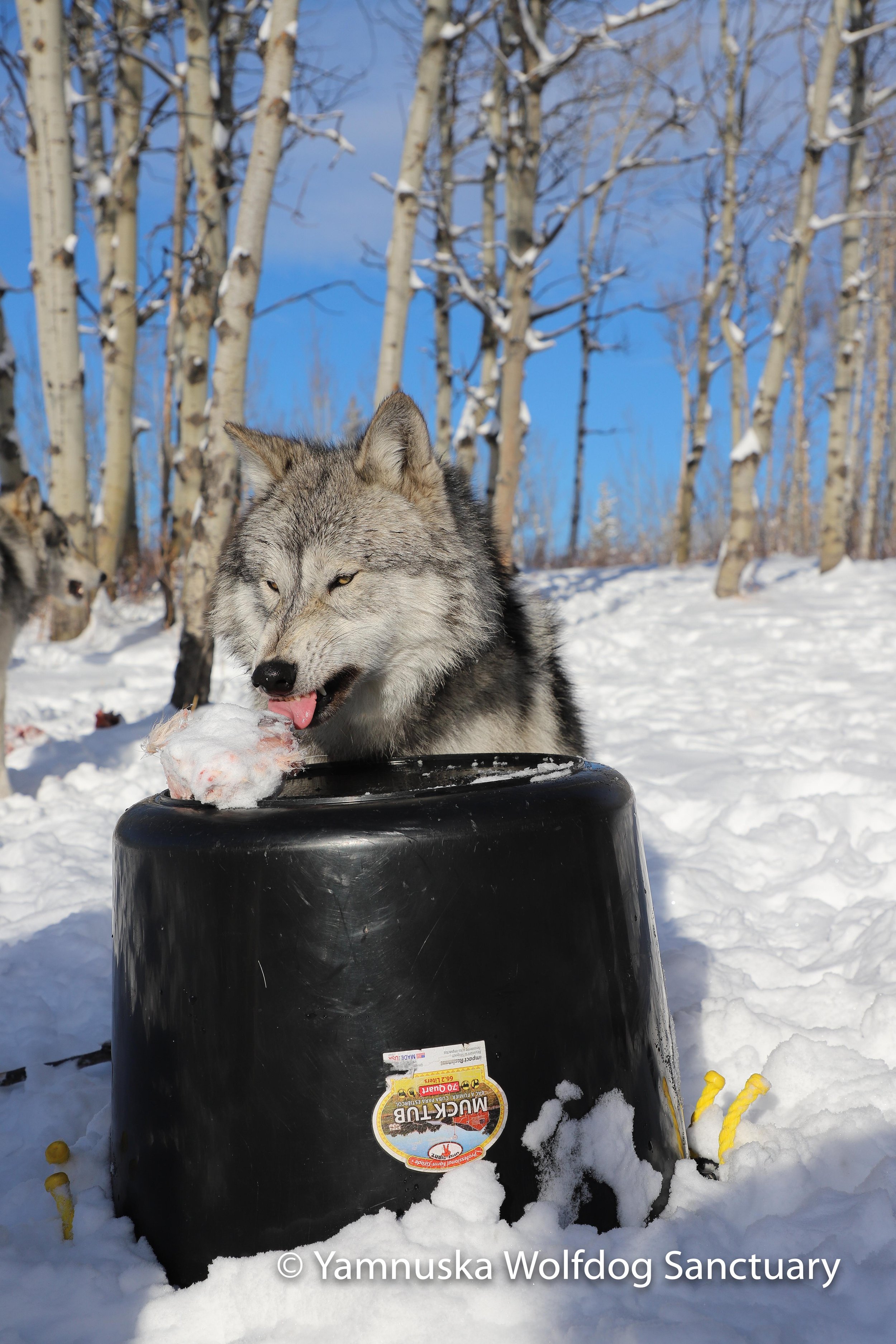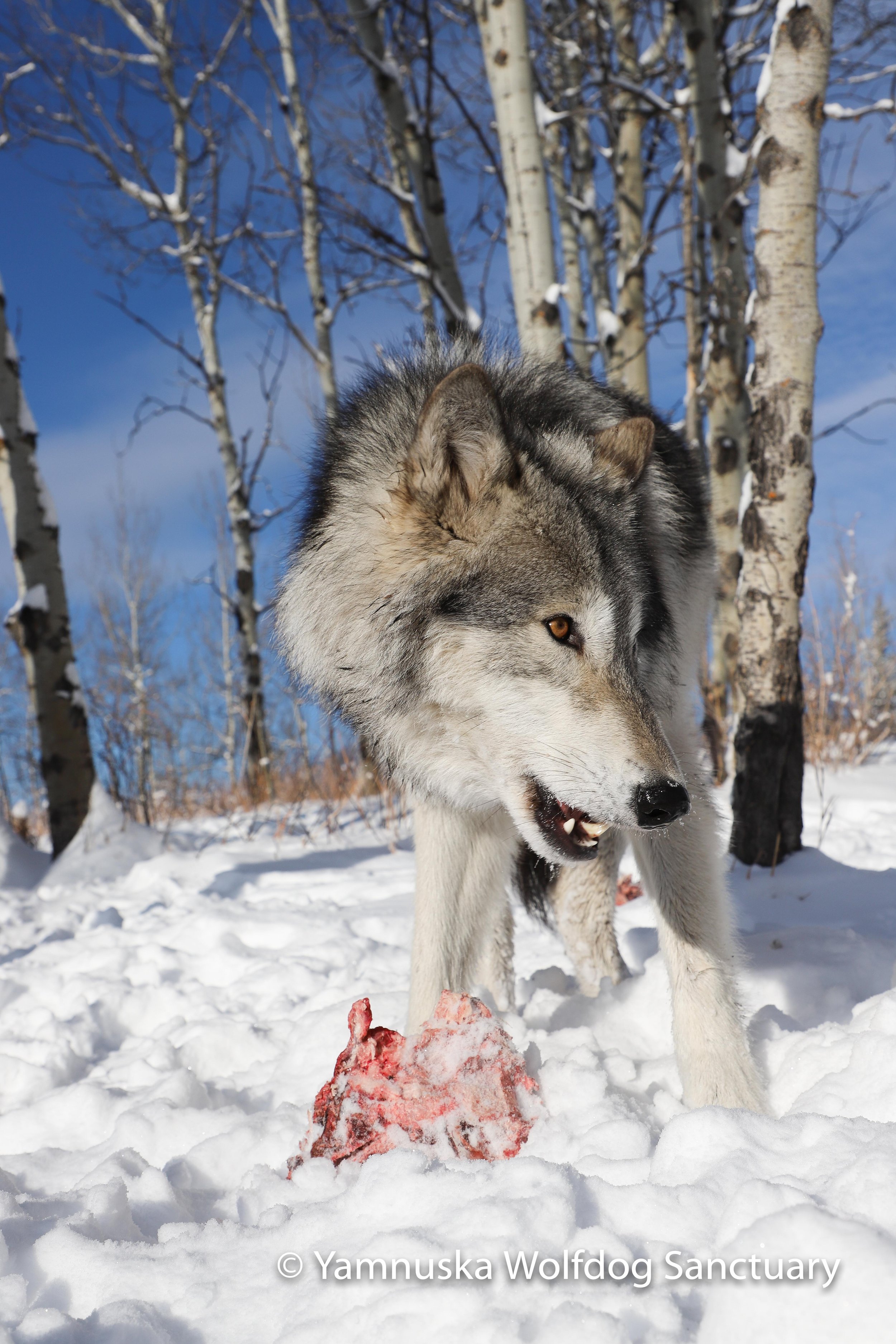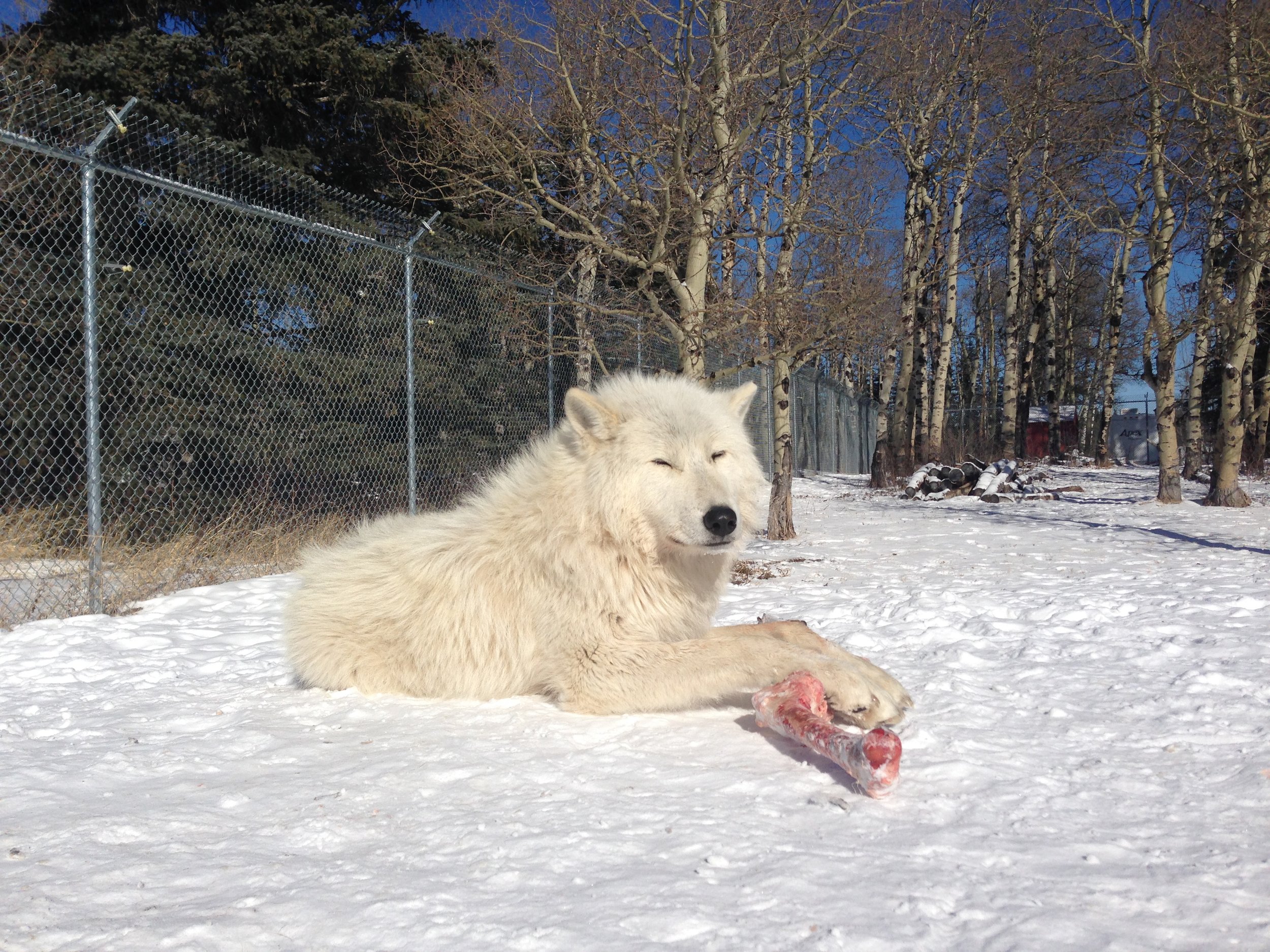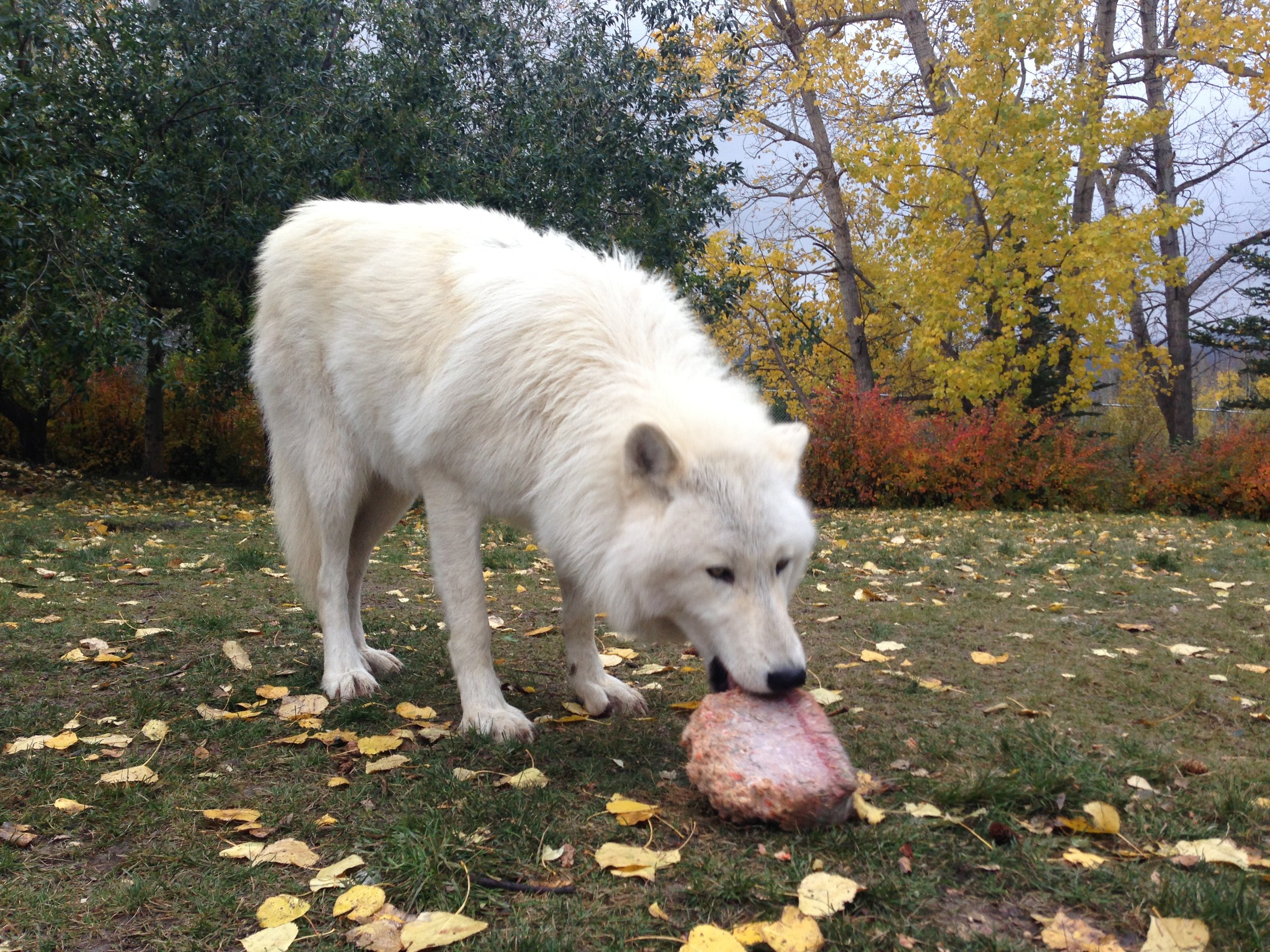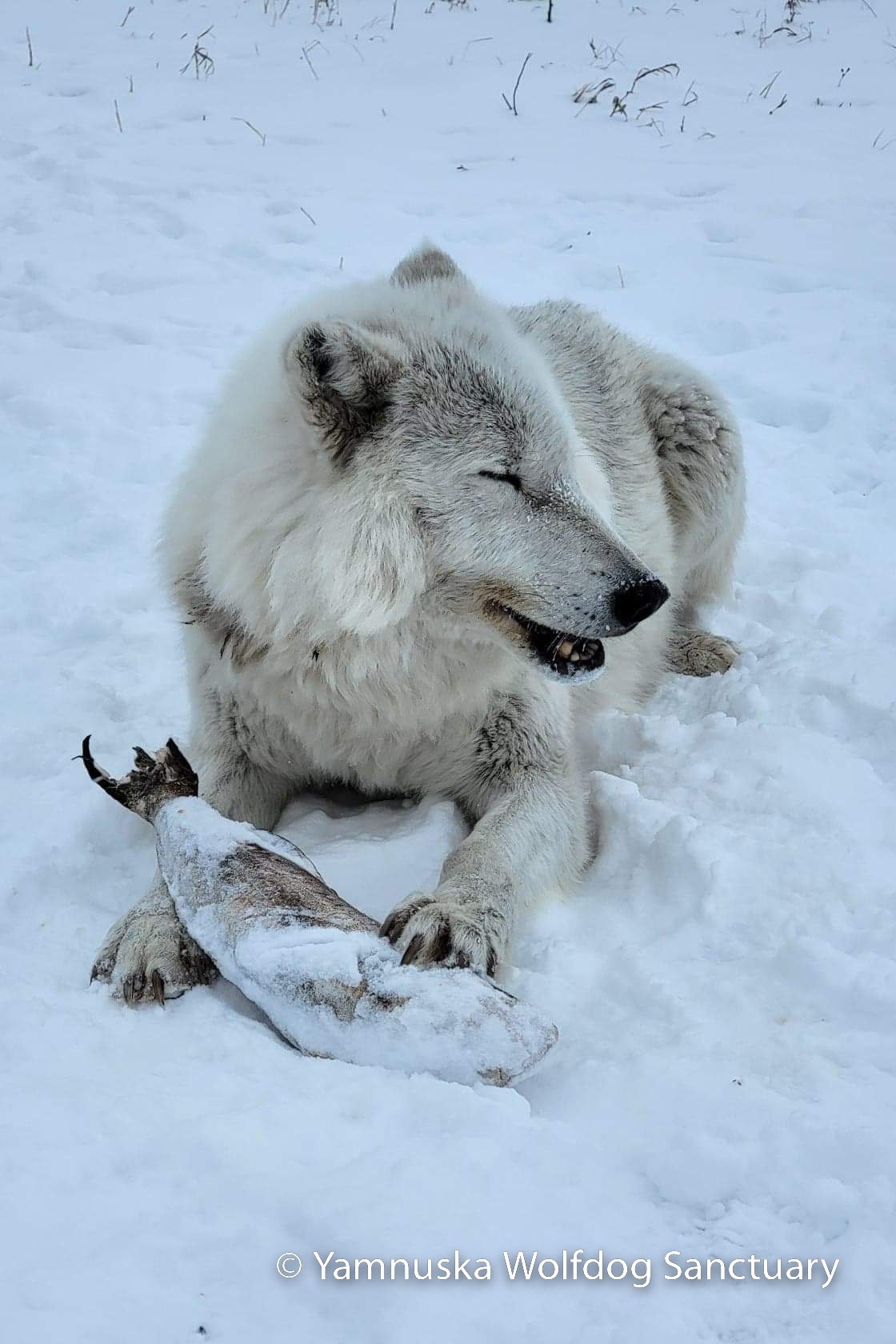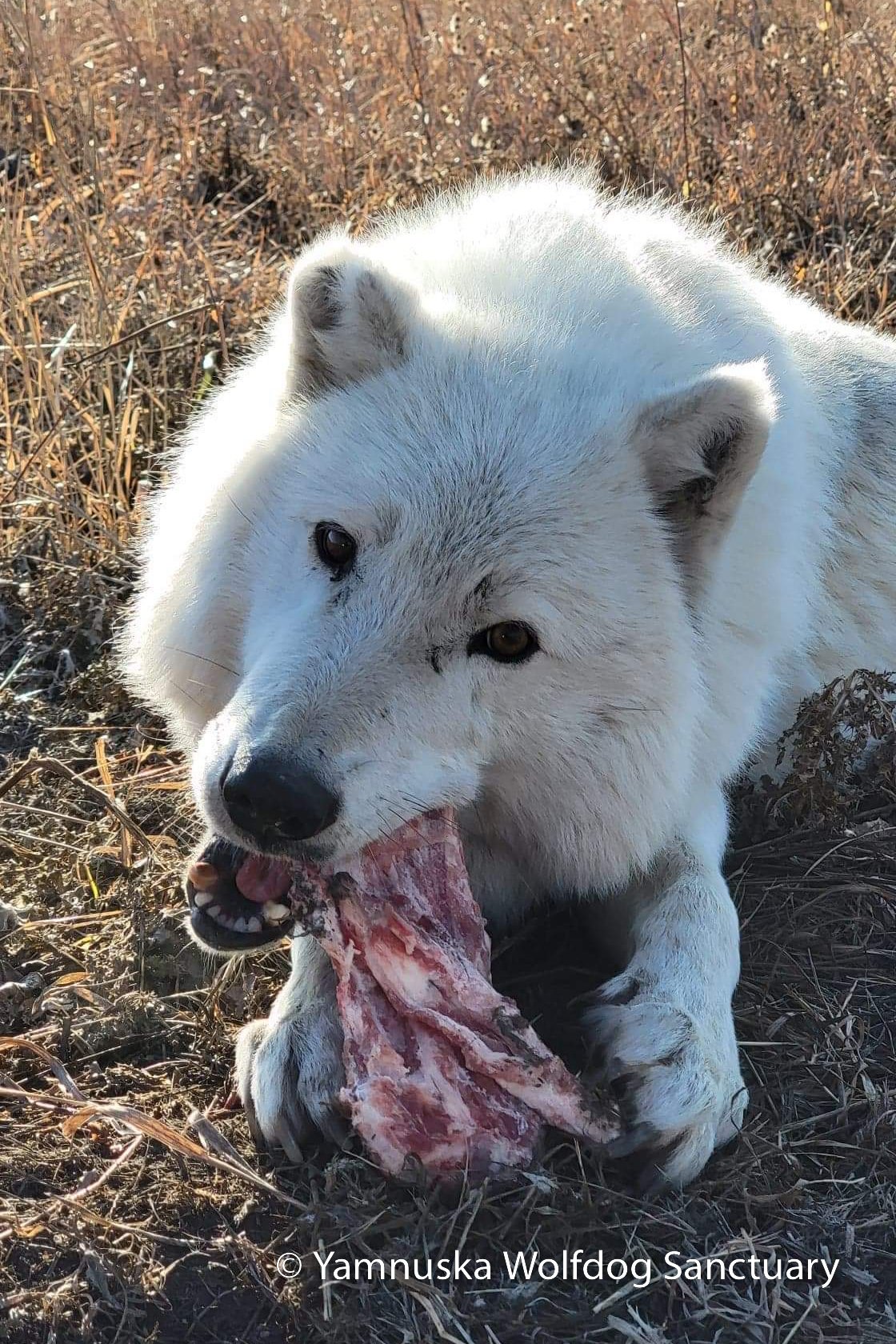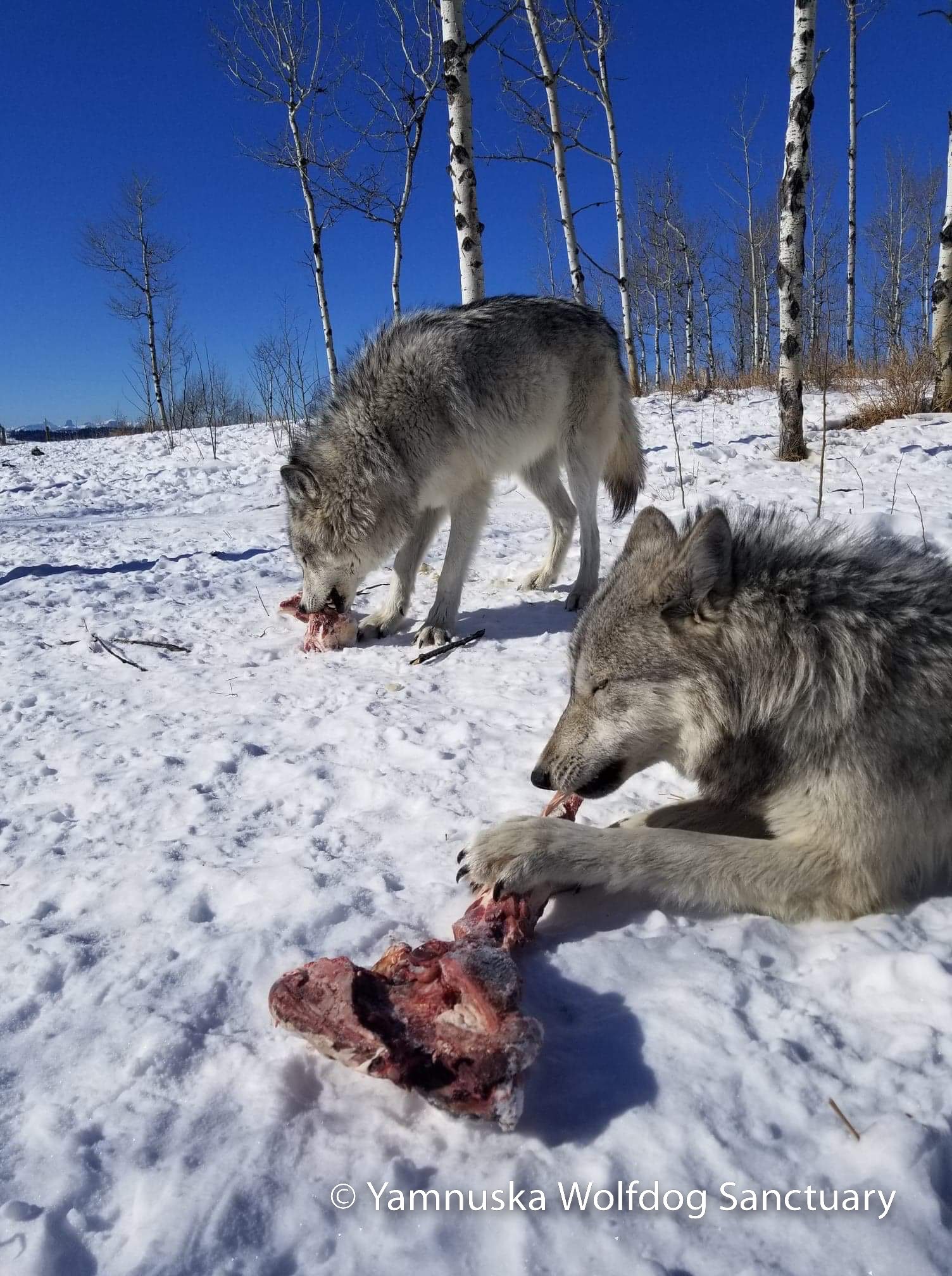Diet and Nutrition
Knowing what to feed your wolfdog can be tricky! Should you feed them kibble, is raw food a must, what about freeze dried foods? And ultimately what is best for your wolfdog?
When it comes to wolfdogs, depending on the content level, there may be some unique dietary requirements you will have to think about. The higher the wolf content, the less likely your wolfdog will do well eating the same things you feed your domestic dog. In simpler terms, you may need to swap the kibble diet for a raw based diet.
This all traces back to the evolution of wolves versus dogs. Wolves have evolved in the wild to predominantly eat unprocessed meat; think ungulates (deer, elk, moose) and small mammals (rabbits, mice, squirrels). Through the domestication process, dogs evolved to eat more of the same things that us humans eat; think meat, grains, and veggies. This means that a high content wolfdog’s digestive system likely isn’t going to be very good at digesting processed kibbles, especially those that are high in grains, or those that are overly processed. Things like canned food can also wreak havoc on a wolfdog’s digestion.
Of course, digestive systems can be very individualized between animals, but I have found that generally speaking, low content wolfdogs can do well on a high quality, high protein kibble, while high content wolfdogs very much require a raw based diet. Some animals may in time be able to adjust to a specific food, but don’t expect a high content wolfdog to ever do well on Alpo or Kibbles n’ Bits. Below I will detail my experience with different foods for the wolfdogs. Use this information to make your own decisions about what is best for you and your wolfdog.
Kuna letting Zeus (who is conveniently hiding behind me) know that he better not mess with her meat. We all know not to mess with Kuna when it’s dinner time!
Let’s look at some of the different options available to us as wolfdog owners.
-
I highly recommend feeding your wolfdog raw food. I find as a whole they just seem to thrive on a well rounded raw based diet. One thing to keep in mind with a raw diet is that you want to ensure you are feeding your wolfdog a balanced or complete raw diet. This means ensuring they are not only getting muscle meat, but also bones, organs, cartilage and some fruits and veggies. Most commercially prepared raw dog foods that you can buy in pet stores are complete. If you choose to make your own at home, you will want to do your research and ensure you are including all these things in the right ratios.
Here at the Sanctuary we feed our wolfdogs a commercial raw food. We go through approximately 150lbs of raw food a day! One thing I will note is that we choose to feed the raw food frozen. It helps slow the wolfdogs down a bit but also does a great job at cleaning their teeth. It’s also logistically impossible to thaw that much raw food every single day.
For feeding amounts, follow the directions on the label and adjust from there. Most of our wolfdogs eat 1.5-3lbs per day.
Pros:
-most ‘natural’ food for them so digestive issues are rare
-easily digested so the body is able to break down and absorb all the micronutrients efficiently and effectively
-if fed frozen, helps keep teeth clean
Cons:
-plenty of freezer space required
-if you have an indoor wolfdog, expect them to want to eat their raw food anywhere but in their dog bowl (ie. your couch, dog beds, etc.)
-can be a pain to have to thaw (if choosing to thaw)
-
A high quality, high protein kibble can be a great option for many low content wolfdogs. When shopping for kibble, make sure to buy a kibble that is devoid of fillers and dyes. Remember, if the kibble is coloured and cut into fun little shapes, the dog food company cares more about pleasing you than it does about providing good nutrition to your dog. Good quality kibbles will list a real meat source as the first ingredient and not have to hide behind fancy marketing and gimmicks. Also, if you can buy it at the grocery store, it’s likely a crappy kibble. Go to a quality pet store that actually specializes in animal products and pick up a good bag of kibble there. You can choose to go grain free or not, as long as grain isn’t the predominant ingredient.
Pros:
-easy to feed and store
-good for wolfdogs who like to graze all day
-can be used as enrichment to stuff into toys, kongs, etc.
-won’t make a mess in your house
Cons:
-must do your homework to distinguish ‘good’ kibbles from ‘bad’ kibbles
-can cause digestive issues in some wolfdogs
-may require some trial and error until you find a brand your wofldog does well on
-
I don’t have much experience with freeze dried foods. I mainly use it here and there as a treat, but have never solely relied on it for their actual meal. I think it’s probably a good middle ground between raw and kibble, but personally I find it a pain to have to rehydrate.
Pros:
-easier to digest than a processed kibble
-easy to store
Cons:
-annoying to have to rehydrate before feeding
-some wolfdogs may find it revolting as it’s wet and kind of gloopy
-does nothing to help keep teeth clean
-
If there’s one thing I have experience with other than raw food, it’s dog treats! We go through so many treats at the Sanctuary, it’s not even funny. Treats are a fantastic way to bribe wolfdogs, however they must be used in moderation as to not upset their digestive systems as they are essentially junk food. Of course every wolfdog has their own preferences, but below I will compile a list of treats that wolfdogs tend to love and which ones they tend to dislike.
Treats they love:
-jerky treats
-meaty, soft treats
-smelly treats (bully sticks, fish skin, tripe treats, etc.)
-disgusting treats (chicken/duck feet, rabbit/lamb ears, you get the idea…)
Treats they dislike:
-anything dry and biscuity
-non-meaty treats (sweet potato treats for example)
-weird textures (dentastix, greenies, etc.)
-shrink wrapped, stale, smoked bones (the ones that are clearly sprayed with all sorts of preservatives and just smell like chemicals)
-
Supplementing your wolfdog’s main diet with other types of food can keep things interesting and add enrichment to their lives. Note, that I say supplement! This is not a replacement for a complete diet. However, through supplementing other types of food, this can be a good option to cut down on some of your feed costs. At the Sanctuary we ensure all the wolfdogs get their complete meals, and then we supplement with some of the following things:
-raw bones (never feed cooked bones as they can splinter and cause serious issues)
-donated meat from people cleaning out their freezers (we only accept unseasoned, unprocessed and uncooked items). This can range from roasts, steaks, pork chops, chicken wings, whole fish, ground meats, sausages, pork fat, the list goes on.
-donated meat from restaurants and grocery stores*
-donated deer bones and trimmings during hunting season*** (see note below)***
*some grocery stores and restaurants are happy to give away meats that are at their ‘sell-by’ date and would otherwise just be thrown in the garbage
***Important Note on game meat*** When feeding your wolfdog game meat please ensure you are taking the precaution of freezing the meat 7 to 10 days. This helps kill any potential harmful parasites. I learnt this lesson the very heartbreaking way when one of my wolfdogs became fatally ill after contracting a parasite found in deer meat. I freeze all donated meat at least 2 weeks to minimize any risk to the wolfdogs. I have also made the personal choice to not feed roadkill as the health of the animal prior to death is unknown. At least with donated meat from hunters, you know the animal they chose to kill is likely not a sick one!
So based on my list above, in order to decide what is best to feed your wolfdog, do some trial and error and see what works well with your lifestyle as well! If you rather not feed raw, try purchasing a high quality, high protein kibble and see if your wolfdog does well. Supplement with things like meaty bones to help keep their teeth clean. Feel free to get creative too. If you have extra eggs laying around in your fridge, try giving your wolfdog those!
Food as Enrichment
Food can be used as an excellent source of enrichment for wolfdogs! Use the Supplementary Foods list to have some fun with your wolfdog and add extra stimulation to their day. For example, you can use high value food items like bones if you know you will have to leave your wolfdog in their containment the whole day while you’re at work. Here at the Sanctuary, we have tied meat up on ropes for them to have to tug at, we hide meat bits up in trees and on their platforms, and we have even thrown whole frozen fish into their stock tanks for them to fish out. You can do so much with food to add daily mental and physical stimulation to their lives. It’s also a lot of fun watching them have to use their problem solving skills to get the food.
There will be a whole section on wolfdog enrichment shortly (perhaps it already exists by the time you are reading this) so make sure to check that out!



